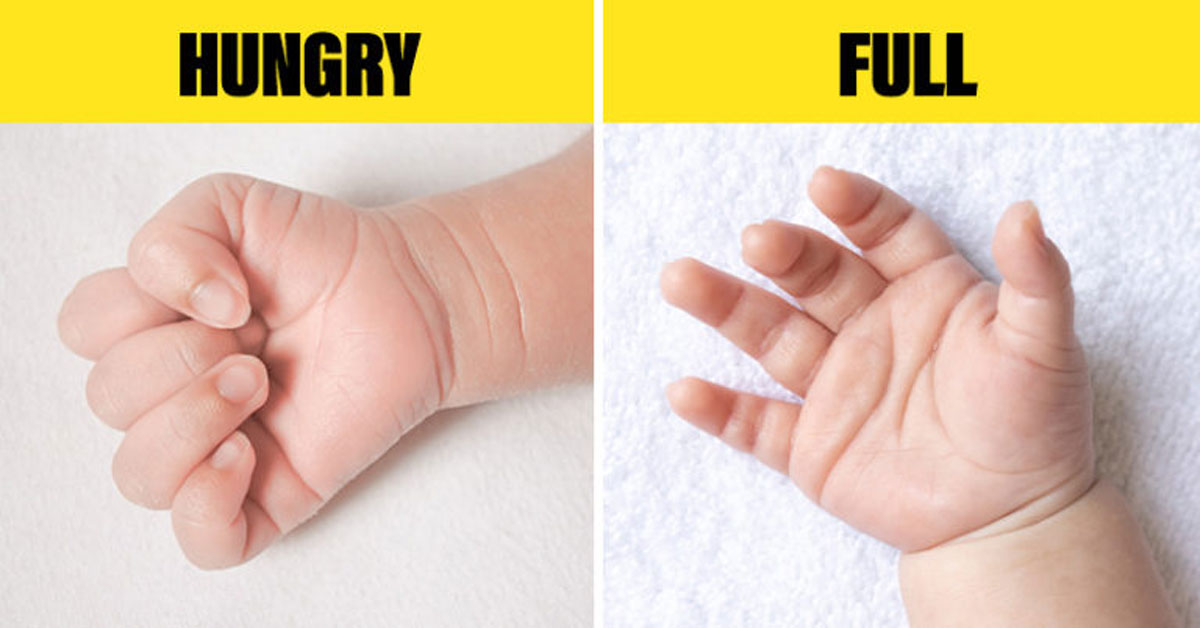Your baby is constantly trying to communicate their needs and desires to you. Without the ability to speak, however, it can sometimes be difficult to understand your baby. For parents, determining whether their baby is hungry, uncomfortable, happy, or scared can often feel like a guessing game. This is how you can understand your baby better.
Babies Are Unique
Every baby is different and will communicate with you in their own unique ways. In most cases, it just takes time as a parent to learn your baby’s body language. That being said, there are several behaviors that are common for many babies, and knowing what those are can make that guessing game a little easier. If you are a parent, getting to know these common signals may help you to better understand your baby.
Twelve Signs to Help You Understand Your Baby
As we said, every baby is different and will communicate with you in their own unique way. The following behaviors, however, appear to be quite universal, and many experts have agreed that most babies will use them to send specific messages to their parents. At the very least, being familiar with these behaviors will help you narrow down the possibilities so you can understand your baby and provide them with what they need at that moment.
1. Crying

Of course, crying is probably the most well-understood sign that something is not right in your baby’s world. The hard part, of course, is determining why they’re crying. As you get to know your baby better, however, you will start to be able to decipher their cries. Here are some examples of different cries, and what they might mean:
A calling cry

If your baby is making short, low-pitched cries that rise and fall, there’s a good chance that they are hungry. Often, you will hear them do this for a few seconds, and then stop for a bit, as if they’re waiting for you to respond. If you don’t respond right away, the pauses will become shorter and less frequent.
In this case, your baby may also just be looking for comfort. In this case, picking them up and offering them a pacifier can help them to calm down.
A sleepy cry

When your baby is tired, they may begin to get fussy. It might sound like a smooth whining, and your baby will likely be yawning, too. You can help them go to sleep by swaddling them or taking them out in the stroller or car. The vibrations from movement can often help lull babies to sleep.
An allergy cry

If you notice your baby is often crying after feeding, it may be because of an allergy. Mothers who are breastfeeding can pass on what they eat to their babies, which can upset their stomachs. If this happens frequently, they might have an allergy to cow’s milk, wheat, or other foods.
A reflux cry

Another reason your baby might be crying after feeding is that they’re having trouble keeping some of their food down. If you think that might be the case, talk to your doctor about the possibility of reflux. In most instances, all you need to do is give your baby formula.
Keep in mind that crying after feeding, especially for bottle-fed babies, is often just a sign that they have swallowed air. To prevent this, try to burp your baby often during meals and feed them while they’re sitting up. You can also try using special pacifiers that prevent swallowing too much air.
Colic

Colic usually stops after three or four months, but if your baby continues to cry for a long time, check with your doctor to make sure there’s not something more serious going on.
In the meantime, there are some things you can do to try to soothe your baby. Running or walking with them or offering a pacifier can help. There are also some herbal remedies like fennel or chamomile that you can use, but you should talk to your doctor first [1].
2. The Sounds They Make

Your baby can’t talk, but they can certainly make sounds! Knowing what these sounds might mean can go a long way in helping you understand your baby. Australian pediatrician Priscilla Dunstan has been researching and studying the sounds babies make for twenty years. She has identified five key sounds that she believes are consistent with new babies across the world.
Some sounds babies make include; “Neh” which means your baby is hungry, “Owh” which means they are sleepy, “Eh” which is a signal that your baby is about to burp, “Eairh” is the sound they make when they have gas in their tummies, and “Heh” means they’re feeling uncomfortable in some way.
Of course, these sounds may not be consistent all of the time, nor may they be true for every baby. As a parent, pay close attention to the sounds your baby is making. You may be able to identify a pattern and understand your baby a little bit better [2].
3. Arching Back

When a baby arches their back, it is usually a signal that they are in some kind of pain. In most cases, this pain or discomfort is not serious. The following are possible reasons why your baby might be arching their back:
Colic

Colic babies experience gastrointestinal discomfort that may make them arch their back when they cry.
Acid reflux

In adults, this can be minor discomfort, but for infants, it can be very uncomfortable. If this is the case, you should talk to your doctor.
Nerve damage

Babies can often suffer some nerve damage during a long and difficult vaginal delivery. This can trigger pain along your baby’s neck and back.
Jaundice

Most newborns experience jaundice to some degree. It is caused by excess bilirubin, which is a waste product of red blood cell breakdown, in the baby’s bloodstream. It is not usually painful if you get your baby treated. Many experts view crying with an arched back, however, to be an early symptom of severe jaundice.
Cerebral Palsy

Cerebral Palsy is when there is damage to the developing brain of the baby or fetus. This impairs the brain’s ability to control and coordinate your baby’s muscle movements. Back arching in newborns is one of the earliest signs of this condition [3].
4. Constant Kicking

To understand why your baby is kicking, you need to also assess the behavior that is accompanying it. Stretching and kicking are normal, and it helps your baby strengthen their legs to eventually do things like roll over, crawl, and walk.
Claire McCarthy, MD, says that if your baby seems happy and smiley, leg-kicking is likely a sign they want to play. If they seem fussy, something is bothering them. “It could be anything from gas to a dirty diaper to a cramped car seat, so do a quick once-over to see what might be bugging her,” she says [4].
5. Head-Banging

Although it may seem alarming to see your baby purposefully (lightly) hitting their head against the floor or the bars of their crib, this is actually very normal. In most cases, they are not causing themselves any harm.
Babies actually find rhythmic head-banging to be soothing, and they sometimes use it as a form of stimulation or self-comfort. That being said, if your baby is banging their head often for long periods of time, and does not appear to be engaging with others or their toys, it could be a sign of a developmental problem [5].
6. Grabbing Ears

Many parents automatically assume that grabbing ears is a sign of an ear infection. Most of the time, however, it’s merely a sign that your baby has just discovered they have ears. However, if your child is pulling at their ears and also exhibiting the following symptoms, you should take them to the doctor:
Tugging or pulling at the ear(s), fussiness and crying, trouble sleeping, fever (especially in infants and younger children), fluid draining from the ear, clumsiness or problems with balance, trouble hearing or responding to quiet sounds [6]
7. Clenched Fists

This is completely normal, and most newborns hold their hands in a fist position for the first several weeks of their lives. Finger and hand movements require a more advanced nervous system, which your infant does not yet have.
Most newborns will start to open up their hands after about eight weeks. However, clenched fists can be a sign of stress or hunger. In this case, you will likely notice that your baby’s entire body is tensing up, not just its hands [4].
8. Pulling Their Legs to Their Tummy

Typically, this is a sign that your baby is experiencing abdominal discomfort. This could be from having gas, constipation, or having a bowel movement. When this is the case, your baby will also likely be crying or displaying other signs of discomfort as well. Colic babies will often bring their knees up to their chest when they cry [7].
9. Arm Jerks

Sudden jerks or twitches of the arms, hands, and legs, while your baby is sleeping, are completely normal. Typically, this will occur soon after they’ve fallen asleep, and may even wake them up. It is called the Moro reflex, or startle reflex. When something triggers this reflex, your baby will extend their arms out straighten them, and throw their head back.
If your baby’s Moro reflex is only occurring on one side of the body, or if they don’t have one at all, it may be cause for concern. Possible causes could be injuries from the birthing process, infections, muscle weakness, spastic cerebral palsy, and peripheral nerve damage [8]
10. Hands in Their Mouth

This is yet another sign that your baby is hungry. Since babies are often putting their hands in their mouths, this can be an easy sign to miss. Pay attention to whether or not it is accompanied by other signs of hunger, like puckering, smacking, or licking their lips [9].
11. Turning Their Head Away

This likely means that whatever you’re doing, it’s not what your baby needs at that moment. Babies don’t have much control over their bodies, so turning their heads away is one of the few ways they can communicate that they don’t like what you’re doing.
This may occur when your baby is tired of playing. If this is the case, set the toys down and try cuddling for a while instead, or putting them down for a nap [10].
12. Turning Their Head Toward Your Breast

This is called the “rooting” reflex and usually lasts for the first four months of your baby’s life. It starts when you stroke or touch the corner of your baby’s mouth. They will turn their head and open their mouth to follow the source of the touch. This helps them find the breast or bottle so they can feed. If your baby is turning their head toward your breast, it is a sign that they are hungry [11].
When In Doubt, Ask for Help
While these signs are very common that does not mean that they are one hundred percent universal. Your baby likely has their own unique sounds and movements that you will get to know as they grow.
If you notice your baby is doing something abnormal and you can’t determine the reason, don’t hesitate to talk to your doctor and get their opinion. In most cases, it is likely nothing serious, but you will rest much easier if you get it checked out to be sure.
Keep Reading: These powerful photos prove feeding a baby is beautiful no matter how you do it
Sources
- ‘Why Is My Baby Crying?’ Web MD
- ‘It all began with Priscilla Dunstan’ Dunstan Baby
- ‘Arched Back Crying Baby’ Birth Injury Help Center
- ‘Decode Your Baby’s Body Language’ Parents Caroline Schaefer. Published December 11, 2011.
- ‘Is Head Banging Normal?’ Kids Health Elana Pearl Ben-Joseph
- ‘Ear Infections in Children’ NIDCD
- ‘Understanding Colic | 9 Causes and 14 Remedies’ Colic Calm
- ‘What to know about the Moro reflex?’ Medical News Today Jamie Eske. Published December 20, 2019.
- ‘Signs Your Child is Hungry or Full’ CDC
- ‘Baby body language: 3 common moves decoded’ Todays Parent Tracy Chappell. Published December 13, 2013.
- ‘Newborn Reflexes’ Stanford Children’s Health

